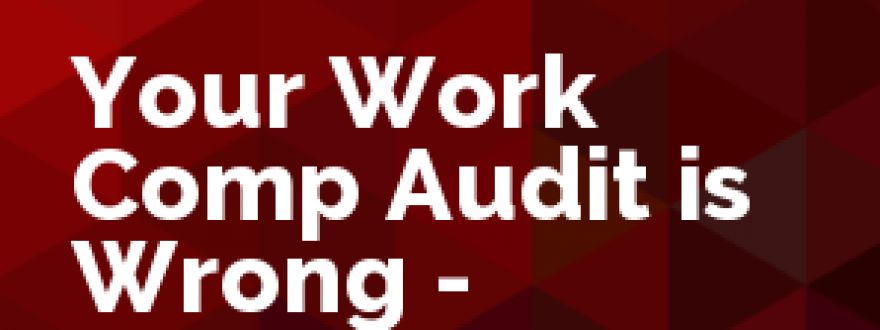
Three out of every four Work Comp premium audits are wrong
The vast majority of those mistakes result in employers paying MORE than they owe rather than the insurance company collecting less than they should.
Too often, the mistakes could be prevented simply by making sure the employer knows how to keep their books and is prepared for the auditors arrival.
Approximately three out of every four Work Comp premium audits are wrong. And often times, business owners are not aware of the errors in the premium calculation following their annual Work Comp audit. There is a wide-ranging list of common audit errors which contribute to the high percentage of audits being incorrect. Even the most minor of mistakes can result in a drastic overcharge of your Work Comp premium. Here are some of the most common and most impactful errors that may be costing you thousands of dollars a year in Work Comp premium.
1. The Wrong Work Comp Class Code Was Used
Work Comp job classification codes identify the type of business in question and places that said business into rating groups. In most cases, your business will be classified by a single class code that best represents its general operations. In some cases, businesses are permitted to use multiple class codes for various job activities included within the business. Since there are several hundreds of classifications to choose from, it is no surprise that many audit errors are due to these misclassifications. In short, if you are misclassified, you will be improperly rated, and very often times, overcharged.
2. There is a Mistake in Payroll Calculation
One of the most fundamental reasons as to why an audit is incorrect is due to the fact that many employers do not understand what kinds of pay can be excluded from their payroll. As a result, employers end up paying extra premium based on a payroll that is higher than it ought to be. Even when employers are aware of what is deductible from their payroll, many do not often have the documentation that specifies the amount and reasoning as to why a portion of the payroll ought to be excluded. Merely knowing what can be excluded from your payroll and having the proper documentation on hand, is one of the most proven ways to ensure that an audit is done correctly and quickly.
3. Charged for Subcontractors on Your Audit
Often times auditors will charge employers for any subcontractors due to the fact that these laborers are either uninsured, or the employer does not have a valid certificate of insurance for each subcontractor. That certificate of insurance is the only way to validate that your subcontractor carried Work Comp and is the only way for you, as the business owner, to avoid paying for Work Comp that your subs may already carry. Keep in mind, the auditor works for the insurance company and is looking for anything that may generate premium for the insurance company. Charging for uninsured subs is one of those premium generators. Hiring insured subcontractors and having those insurance certificates on hand will prevent such overcharges.
There are many other errors that contribute to the high amount of incorrect Work Comp audits. Being well-prepared and having necessary documentation on hand will help speed along the audit process and help manage the ultimate cost of your Work Comp insurance. You must be devoted toward maintaining an organized and error-free audit package to avoid these abrupt charges.
Most of those mistakes are the result of insufficient recordkeeping and/or presenting incomplete records to the premium auditor. Fixing those mistakes after the fact is somewhere between very difficult and impossible.
For your Audits we Can Help You Walk through the Process from A to Z. Make sure the auditor is reporting information correctly espcecially when it comes to 1099 independent contractors, Family owned operations, Exluding Officers, Excluding Family Members who are owners.
Premium Audits if done incorrectly can become a nightmare in some cases, Auditors look for more premium to return to the Insurace Company.




